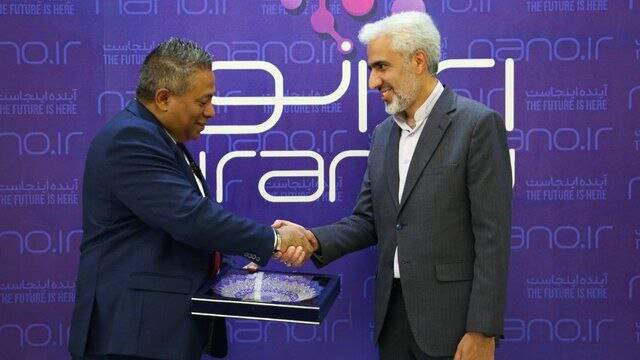Tehran – The preparation of documents for the development of nanotechnology in Venezuela using Iranian knowledge and expertise is being discussed by officials from both countries.
Emmad Ahmadovund, head of the Iran Nanotechnology Initiative Council. Iran’s Venezuela ambassador Carlos Antonio Alcala Cordone and Venezuela’s vice-science minister Alberto Quintero met on Tuesday to nurture scientific and technical connections in Tehran, Isna reported.
During the meeting, Quintero emphasized educational cooperation in the nanotechnology sector over the past two years, saying that Sharif University of Technology had held a one-month intensive course in Venezuela in this regard.
As part of the programme, Venezuelan researchers will take part in advanced lab courses scheduled to be held in Iran, officials noted.
Both sides agreed to organizing joint scientific conferences and symposiums, publishing joint scientific articles, and indexing Venezuelan publications in international databases. Venezuelan officials also invited notable Iranian professors to participate as key speakers at these events.
Furthermore, both sides emphasized the need to transfer nanotechnology to the construction, agriculture and industrial sectors. It has also been decided to hold in-person and online laboratory training courses for researchers in Venezuela, Iran.
Following Ahmadvand’s proposal, the development of a document on the expansion of nanotechnology in Venezuela is placed on the agenda of cooperation. This document aims to leverage Iran’s nanotechnology expertise to develop a roadmap for future collaboration.
Global Leader in Iran Nanotechnology
Iran’s investment in nanotechnology research and development has led to the rise of the country as a global leader in nanotechnology, producing and exporting products to various countries around the world.
Access to domestic resources, competitive prices compared to Western countries, as well as high production of raw nanomaterials, nanocatalysts, and advanced equipment, as well as geographical proximity to target markets in neighboring countries, reduced transportation costs, political and trade relations, made Iran become a leading manufacturer of regional nanotechnology products.
Iranian nanotechnology products from various industries are divided into 13 major categories, including civil engineering and construction. Optics, electronics, and photonics. Oil and petrochemists; medicines, health, and happiness. Home appliances; Power and energy; Raw materials; Chemicals; Textiles and clothing; Equipment; Automotive industry and transportation. Industrial machinery; data released by the Vice President of Science and Technology shows agriculture, animal care and water.
Iran’s achievements in nanotechnology are noteworthy. The rise in scientific publications and sales of Nano products prove the rise in Iran as a global leader in this field.
One industry that has experienced good growth in Iran in recent years is the nanotechnology industry, the subject area that has led Iran to an impressive fourth place worldwide.
According to Statnano, a leading nanotechnology website, Iran has made great strides in the field of nanotechnology, ranked fourth in nanotechnology publications.
This ranking testifies to the country’s remarkable scientific development.
This site considers the number of science articles comparing scientific advances in nanoscience, technology and industry.
mt/mg

